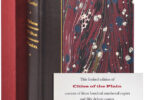Flannery O’Connor, the only child of Catholic parents was born in Savannah, Georgia, on March 25, 1925. She kept Catholicism as a guiding light in every aspect of her life, including her fiction. Less well-known than her fiction, her other writing often focused on Catholicism, theology and sometimes on the subjects of both fiction and Catholicism. She collected books of Catholic theology and wrote over 100 book reviews which appeared in Catholic diocesan publications.
The O’Connor family moved to Milledgeville, Georgia, in 1938. In February of 1941, when Flannery was not quite 16, her father died of lupus, an autoimmune disease. With the exception of only a few years as a young woman, O’Connor lived all of the rest of her life in Milledgeville, including during her first college years at Georgia State College for Women.
In 1945 she went to the University of Iowa where she completed an MFA degree before moving to Yaddo, an artist community in Saratoga, New York. After that she lived in Connecticut for almost two years in the garage apartment of literary friends Sally and Robert Fitzgerald, also Catholics. Robert Fitzgerald, journalist, college professor and highly respected translator of Greek classics into English, later acted as O’Connor’s literary executor. Both he and especially Sally Fitzgerald played critical roles in O’Connor’s legacy by editing her essays, lecture transcripts and letters. These important collections were published after O’Connor’s death: Mystery and Manners, The Habit of Being, and Flannery O’Connor: Collected Works.
By 1950 O’Connor was afflicted by symptoms of lupus, the hereditary disease that had taken her father’s life. After returning to Milledgeville she and her mother moved to their nearby family farm, Andalusia. There she kept up a writing schedule for two hours a day and made the claim that she spent the rest of her time “largely in the society of ducks.” In fact she took much pleasure in the enormous variety of fowl she kept, most famously her peafowl. The term peacock applies to the male birds, with females called peahens, and collectively known as peafowl. Her mother was much less fond of these birds with their habit of ravaging and devouring flowers and foliage.
During the years after her return to Georgia, she lectured extensively, with frequent overlap of subject matter, but with a focus on fiction, the southern writer, and the Catholic writer. Some of these lectures have been edited and collected in Mystery and Manners. Her thinking was complex, instructive, articulate and thought-provoking. Her correspondence gives a fascinating window into her more personal life. An avid correspondent to many, she wrote regularly from 1955 until her death, to a friend named Betty Hester who lived in Atlanta. In 1987 Hester gave O’Connor’s letters to Emory University with the agreement that they would not be made public until 2007. Some of these letters were published in The Habit of Being, but Betty Hester’s name and details about her life were not revealed until 2007.
A sense of place was crucial to O’Connor’s fiction, as was use of language to reflect the place – and her place was the Bible Belt. Her fiction is powerful, with vivid characters and stories that have disturbed many a reader. In her own words she explained, “I think this is a natural belief for a generation that has been made to feel that the aim of learning is to eliminate mystery. For such people, fiction can be very disturbing, for the fiction writer is concerned with mystery that is lived. He’s concerned with ultimate mystery as we find it embodied in the concrete world of sense experience.” (From Mystery and Manners) She wrote two novels: Wise Blood and The Violent Bear It Away. In addition to other collections, her short stories were published with the titles A Good Man Is Hard to Find and Everything That Rises Must Converge.
Her humor was lively in all of her writing. She could be sharp-tongued and opinionated. For example, she wrote, “Everywhere I go, I’m asked if I think the universities stifle writers. My opinion is that they don’t stifle enough of them. There’s many a best seller that could have been prevented by a good teacher.” Fortunately, her guidance and illumination on the art of fiction has served to inspire, more than intimidate, both aspiring and accomplished writers. The University of Georgia Press selects two winners every year for the Flannery O’Connor Award for Short Fiction.
Flannery O’Connor died from complications of lupus on August 3, 1964, at the young age of 39. The farm, Andalusia, preserves the life and times of Georgia’s most famous author and is open to the public. If we say that that her writing and her life provided food for thought, that food is very nourishing and sustaining food.









Happy Birthday, Flannery O’Connor!
Thanks for this well written essay about Flannery O’Connor. I love the example given of her “sharp tongue.” The last sentence makes me want to partake of some of that nourishing and sustaining food for thought.
Excellent post about a great writer, well known and esteemed Georgian. Thank you for your great insights. Very thoughtful overview about Flannery O’Connor’s talent and works. A favorite author of many.
As a Newbie, I am always searching online for articles that can help me. Thank you Wow! Thank you! I always wanted to write in my site something like that. Can I take part of your post to my blog?
Thank you for posting this, it was quite helpful and told a lot.
Now I want to read some of this author’s works! Thank you!
I love it!